Comprehensive Report on Fecal Occult Blood Test (FOBT) in Healthcare
VerifiedAdded on 2022/09/08
|7
|2228
|31
Report
AI Summary
This report provides a comprehensive overview of the Fecal Occult Blood Test (FOBT), a diagnostic tool used to detect occult blood in stool samples. It begins with an introduction to the test, its purpose in identifying potential underlying conditions such as colon cancer, ulcers, and inflammatory bowel disease. The report then details the procedure for both the Guaiac (gFOBT) and Immunochemical (iFOBT or FIT) methods, including sample collection, patient preparation, and analysis. It further explores the reliability, validity, sensitivity, and predictive values of the FOBT, comparing the two main types and discussing the impact of diet and medication on test results. The report concludes by emphasizing the FOBT's role as a screening tool and its limitations, highlighting the need for additional tests to confirm diagnoses. References from current literature are included to support the information presented.

“NUR6512: Week 3”
[Name of Institute]
[Name of Writer]
[Name of Institute]
[Name of Writer]
Paraphrase This Document
Need a fresh take? Get an instant paraphrase of this document with our AI Paraphraser
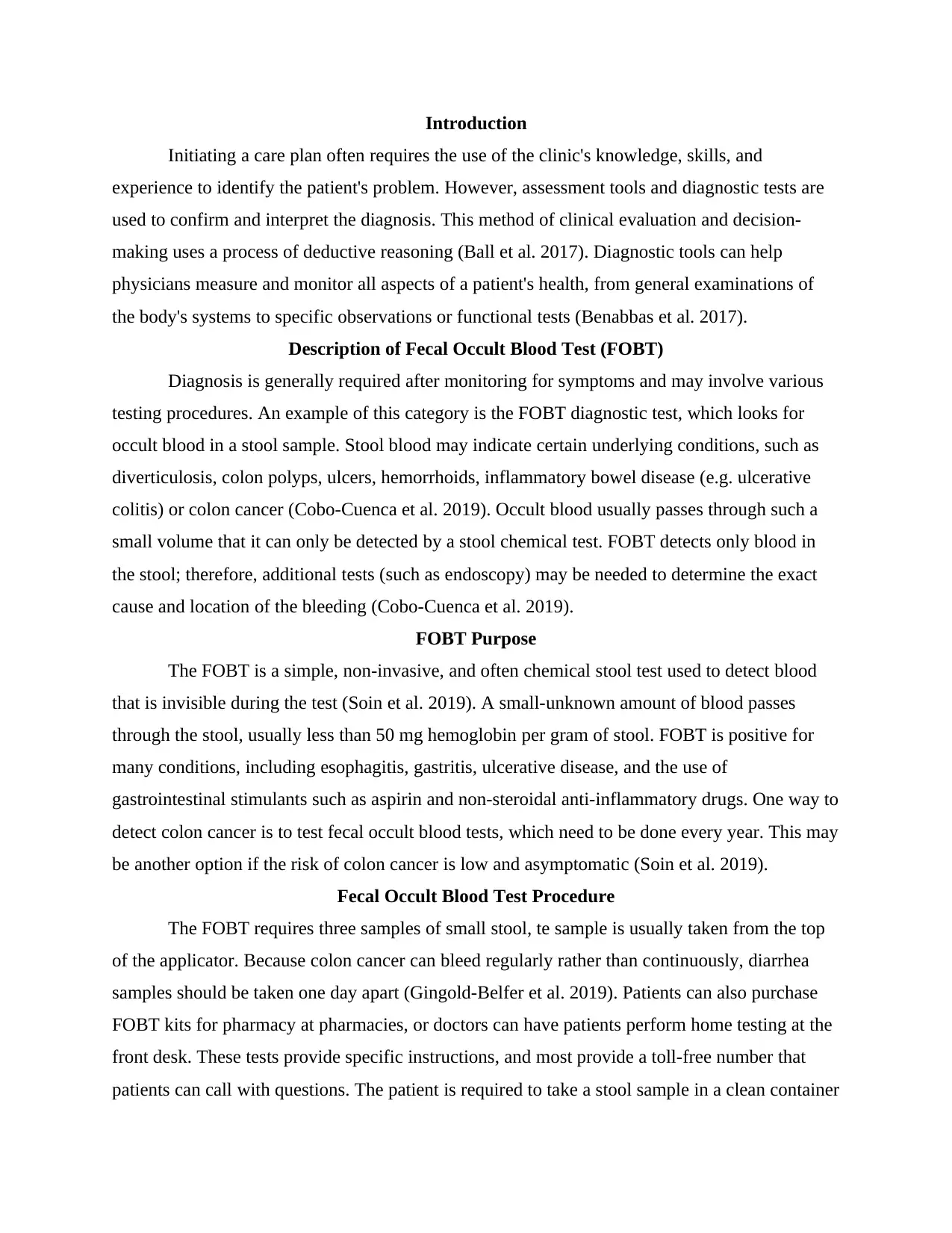
Introduction
Initiating a care plan often requires the use of the clinic's knowledge, skills, and
experience to identify the patient's problem. However, assessment tools and diagnostic tests are
used to confirm and interpret the diagnosis. This method of clinical evaluation and decision-
making uses a process of deductive reasoning (Ball et al. 2017). Diagnostic tools can help
physicians measure and monitor all aspects of a patient's health, from general examinations of
the body's systems to specific observations or functional tests (Benabbas et al. 2017).
Description of Fecal Occult Blood Test (FOBT)
Diagnosis is generally required after monitoring for symptoms and may involve various
testing procedures. An example of this category is the FOBT diagnostic test, which looks for
occult blood in a stool sample. Stool blood may indicate certain underlying conditions, such as
diverticulosis, colon polyps, ulcers, hemorrhoids, inflammatory bowel disease (e.g. ulcerative
colitis) or colon cancer (Cobo-Cuenca et al. 2019). Occult blood usually passes through such a
small volume that it can only be detected by a stool chemical test. FOBT detects only blood in
the stool; therefore, additional tests (such as endoscopy) may be needed to determine the exact
cause and location of the bleeding (Cobo-Cuenca et al. 2019).
FOBT Purpose
The FOBT is a simple, non-invasive, and often chemical stool test used to detect blood
that is invisible during the test (Soin et al. 2019). A small-unknown amount of blood passes
through the stool, usually less than 50 mg hemoglobin per gram of stool. FOBT is positive for
many conditions, including esophagitis, gastritis, ulcerative disease, and the use of
gastrointestinal stimulants such as aspirin and non-steroidal anti-inflammatory drugs. One way to
detect colon cancer is to test fecal occult blood tests, which need to be done every year. This may
be another option if the risk of colon cancer is low and asymptomatic (Soin et al. 2019).
Fecal Occult Blood Test Procedure
The FOBT requires three samples of small stool, te sample is usually taken from the top
of the applicator. Because colon cancer can bleed regularly rather than continuously, diarrhea
samples should be taken one day apart (Gingold-Belfer et al. 2019). Patients can also purchase
FOBT kits for pharmacy at pharmacies, or doctors can have patients perform home testing at the
front desk. These tests provide specific instructions, and most provide a toll-free number that
patients can call with questions. The patient is required to take a stool sample in a clean container
Initiating a care plan often requires the use of the clinic's knowledge, skills, and
experience to identify the patient's problem. However, assessment tools and diagnostic tests are
used to confirm and interpret the diagnosis. This method of clinical evaluation and decision-
making uses a process of deductive reasoning (Ball et al. 2017). Diagnostic tools can help
physicians measure and monitor all aspects of a patient's health, from general examinations of
the body's systems to specific observations or functional tests (Benabbas et al. 2017).
Description of Fecal Occult Blood Test (FOBT)
Diagnosis is generally required after monitoring for symptoms and may involve various
testing procedures. An example of this category is the FOBT diagnostic test, which looks for
occult blood in a stool sample. Stool blood may indicate certain underlying conditions, such as
diverticulosis, colon polyps, ulcers, hemorrhoids, inflammatory bowel disease (e.g. ulcerative
colitis) or colon cancer (Cobo-Cuenca et al. 2019). Occult blood usually passes through such a
small volume that it can only be detected by a stool chemical test. FOBT detects only blood in
the stool; therefore, additional tests (such as endoscopy) may be needed to determine the exact
cause and location of the bleeding (Cobo-Cuenca et al. 2019).
FOBT Purpose
The FOBT is a simple, non-invasive, and often chemical stool test used to detect blood
that is invisible during the test (Soin et al. 2019). A small-unknown amount of blood passes
through the stool, usually less than 50 mg hemoglobin per gram of stool. FOBT is positive for
many conditions, including esophagitis, gastritis, ulcerative disease, and the use of
gastrointestinal stimulants such as aspirin and non-steroidal anti-inflammatory drugs. One way to
detect colon cancer is to test fecal occult blood tests, which need to be done every year. This may
be another option if the risk of colon cancer is low and asymptomatic (Soin et al. 2019).
Fecal Occult Blood Test Procedure
The FOBT requires three samples of small stool, te sample is usually taken from the top
of the applicator. Because colon cancer can bleed regularly rather than continuously, diarrhea
samples should be taken one day apart (Gingold-Belfer et al. 2019). Patients can also purchase
FOBT kits for pharmacy at pharmacies, or doctors can have patients perform home testing at the
front desk. These tests provide specific instructions, and most provide a toll-free number that
patients can call with questions. The patient is required to take a stool sample in a clean container
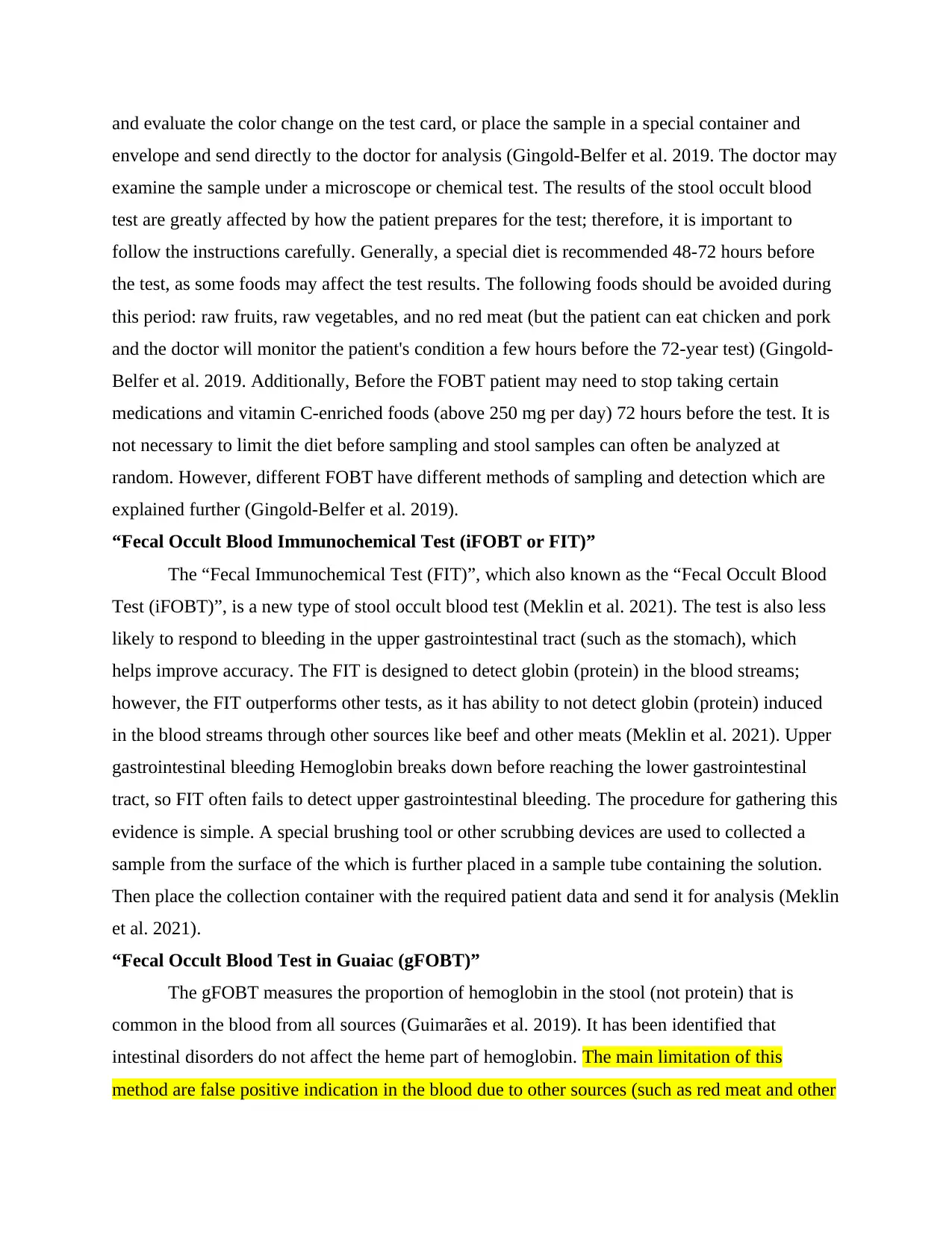
and evaluate the color change on the test card, or place the sample in a special container and
envelope and send directly to the doctor for analysis (Gingold-Belfer et al. 2019. The doctor may
examine the sample under a microscope or chemical test. The results of the stool occult blood
test are greatly affected by how the patient prepares for the test; therefore, it is important to
follow the instructions carefully. Generally, a special diet is recommended 48-72 hours before
the test, as some foods may affect the test results. The following foods should be avoided during
this period: raw fruits, raw vegetables, and no red meat (but the patient can eat chicken and pork
and the doctor will monitor the patient's condition a few hours before the 72-year test) (Gingold-
Belfer et al. 2019. Additionally, Before the FOBT patient may need to stop taking certain
medications and vitamin C-enriched foods (above 250 mg per day) 72 hours before the test. It is
not necessary to limit the diet before sampling and stool samples can often be analyzed at
random. However, different FOBT have different methods of sampling and detection which are
explained further (Gingold-Belfer et al. 2019).
“Fecal Occult Blood Immunochemical Test (iFOBT or FIT)”
The “Fecal Immunochemical Test (FIT)”, which also known as the “Fecal Occult Blood
Test (iFOBT)”, is a new type of stool occult blood test (Meklin et al. 2021). The test is also less
likely to respond to bleeding in the upper gastrointestinal tract (such as the stomach), which
helps improve accuracy. The FIT is designed to detect globin (protein) in the blood streams;
however, the FIT outperforms other tests, as it has ability to not detect globin (protein) induced
in the blood streams through other sources like beef and other meats (Meklin et al. 2021). Upper
gastrointestinal bleeding Hemoglobin breaks down before reaching the lower gastrointestinal
tract, so FIT often fails to detect upper gastrointestinal bleeding. The procedure for gathering this
evidence is simple. A special brushing tool or other scrubbing devices are used to collected a
sample from the surface of the which is further placed in a sample tube containing the solution.
Then place the collection container with the required patient data and send it for analysis (Meklin
et al. 2021).
“Fecal Occult Blood Test in Guaiac (gFOBT)”
The gFOBT measures the proportion of hemoglobin in the stool (not protein) that is
common in the blood from all sources (Guimarães et al. 2019). It has been identified that
intestinal disorders do not affect the heme part of hemoglobin. The main limitation of this
method are false positive indication in the blood due to other sources (such as red meat and other
envelope and send directly to the doctor for analysis (Gingold-Belfer et al. 2019. The doctor may
examine the sample under a microscope or chemical test. The results of the stool occult blood
test are greatly affected by how the patient prepares for the test; therefore, it is important to
follow the instructions carefully. Generally, a special diet is recommended 48-72 hours before
the test, as some foods may affect the test results. The following foods should be avoided during
this period: raw fruits, raw vegetables, and no red meat (but the patient can eat chicken and pork
and the doctor will monitor the patient's condition a few hours before the 72-year test) (Gingold-
Belfer et al. 2019. Additionally, Before the FOBT patient may need to stop taking certain
medications and vitamin C-enriched foods (above 250 mg per day) 72 hours before the test. It is
not necessary to limit the diet before sampling and stool samples can often be analyzed at
random. However, different FOBT have different methods of sampling and detection which are
explained further (Gingold-Belfer et al. 2019).
“Fecal Occult Blood Immunochemical Test (iFOBT or FIT)”
The “Fecal Immunochemical Test (FIT)”, which also known as the “Fecal Occult Blood
Test (iFOBT)”, is a new type of stool occult blood test (Meklin et al. 2021). The test is also less
likely to respond to bleeding in the upper gastrointestinal tract (such as the stomach), which
helps improve accuracy. The FIT is designed to detect globin (protein) in the blood streams;
however, the FIT outperforms other tests, as it has ability to not detect globin (protein) induced
in the blood streams through other sources like beef and other meats (Meklin et al. 2021). Upper
gastrointestinal bleeding Hemoglobin breaks down before reaching the lower gastrointestinal
tract, so FIT often fails to detect upper gastrointestinal bleeding. The procedure for gathering this
evidence is simple. A special brushing tool or other scrubbing devices are used to collected a
sample from the surface of the which is further placed in a sample tube containing the solution.
Then place the collection container with the required patient data and send it for analysis (Meklin
et al. 2021).
“Fecal Occult Blood Test in Guaiac (gFOBT)”
The gFOBT measures the proportion of hemoglobin in the stool (not protein) that is
common in the blood from all sources (Guimarães et al. 2019). It has been identified that
intestinal disorders do not affect the heme part of hemoglobin. The main limitation of this
method are false positive indication in the blood due to other sources (such as red meat and other
⊘ This is a preview!⊘
Do you want full access?
Subscribe today to unlock all pages.

Trusted by 1+ million students worldwide
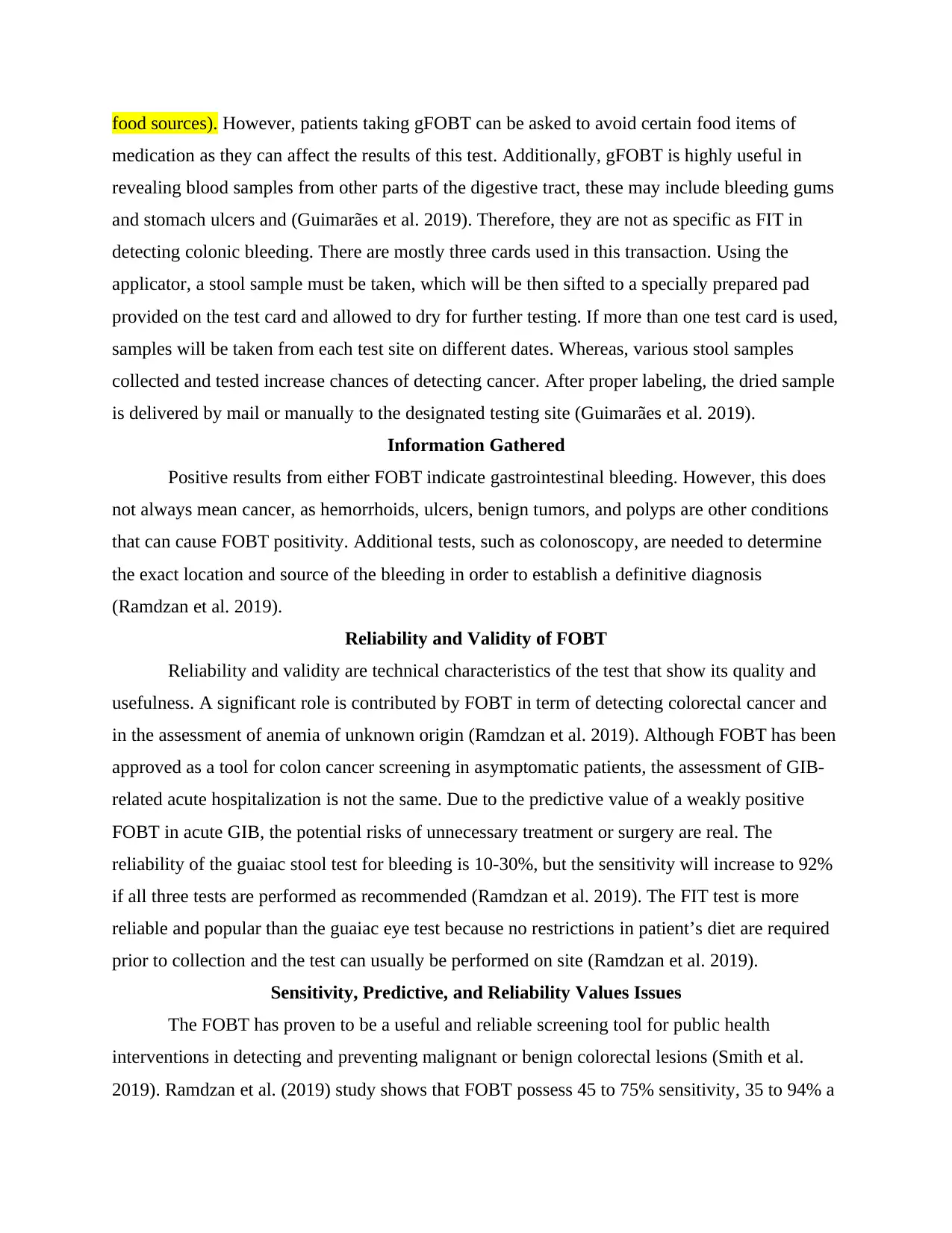
food sources). However, patients taking gFOBT can be asked to avoid certain food items of
medication as they can affect the results of this test. Additionally, gFOBT is highly useful in
revealing blood samples from other parts of the digestive tract, these may include bleeding gums
and stomach ulcers and (Guimarães et al. 2019). Therefore, they are not as specific as FIT in
detecting colonic bleeding. There are mostly three cards used in this transaction. Using the
applicator, a stool sample must be taken, which will be then sifted to a specially prepared pad
provided on the test card and allowed to dry for further testing. If more than one test card is used,
samples will be taken from each test site on different dates. Whereas, various stool samples
collected and tested increase chances of detecting cancer. After proper labeling, the dried sample
is delivered by mail or manually to the designated testing site (Guimarães et al. 2019).
Information Gathered
Positive results from either FOBT indicate gastrointestinal bleeding. However, this does
not always mean cancer, as hemorrhoids, ulcers, benign tumors, and polyps are other conditions
that can cause FOBT positivity. Additional tests, such as colonoscopy, are needed to determine
the exact location and source of the bleeding in order to establish a definitive diagnosis
(Ramdzan et al. 2019).
Reliability and Validity of FOBT
Reliability and validity are technical characteristics of the test that show its quality and
usefulness. A significant role is contributed by FOBT in term of detecting colorectal cancer and
in the assessment of anemia of unknown origin (Ramdzan et al. 2019). Although FOBT has been
approved as a tool for colon cancer screening in asymptomatic patients, the assessment of GIB-
related acute hospitalization is not the same. Due to the predictive value of a weakly positive
FOBT in acute GIB, the potential risks of unnecessary treatment or surgery are real. The
reliability of the guaiac stool test for bleeding is 10-30%, but the sensitivity will increase to 92%
if all three tests are performed as recommended (Ramdzan et al. 2019). The FIT test is more
reliable and popular than the guaiac eye test because no restrictions in patient’s diet are required
prior to collection and the test can usually be performed on site (Ramdzan et al. 2019).
Sensitivity, Predictive, and Reliability Values Issues
The FOBT has proven to be a useful and reliable screening tool for public health
interventions in detecting and preventing malignant or benign colorectal lesions (Smith et al.
2019). Ramdzan et al. (2019) study shows that FOBT possess 45 to 75% sensitivity, 35 to 94% a
medication as they can affect the results of this test. Additionally, gFOBT is highly useful in
revealing blood samples from other parts of the digestive tract, these may include bleeding gums
and stomach ulcers and (Guimarães et al. 2019). Therefore, they are not as specific as FIT in
detecting colonic bleeding. There are mostly three cards used in this transaction. Using the
applicator, a stool sample must be taken, which will be then sifted to a specially prepared pad
provided on the test card and allowed to dry for further testing. If more than one test card is used,
samples will be taken from each test site on different dates. Whereas, various stool samples
collected and tested increase chances of detecting cancer. After proper labeling, the dried sample
is delivered by mail or manually to the designated testing site (Guimarães et al. 2019).
Information Gathered
Positive results from either FOBT indicate gastrointestinal bleeding. However, this does
not always mean cancer, as hemorrhoids, ulcers, benign tumors, and polyps are other conditions
that can cause FOBT positivity. Additional tests, such as colonoscopy, are needed to determine
the exact location and source of the bleeding in order to establish a definitive diagnosis
(Ramdzan et al. 2019).
Reliability and Validity of FOBT
Reliability and validity are technical characteristics of the test that show its quality and
usefulness. A significant role is contributed by FOBT in term of detecting colorectal cancer and
in the assessment of anemia of unknown origin (Ramdzan et al. 2019). Although FOBT has been
approved as a tool for colon cancer screening in asymptomatic patients, the assessment of GIB-
related acute hospitalization is not the same. Due to the predictive value of a weakly positive
FOBT in acute GIB, the potential risks of unnecessary treatment or surgery are real. The
reliability of the guaiac stool test for bleeding is 10-30%, but the sensitivity will increase to 92%
if all three tests are performed as recommended (Ramdzan et al. 2019). The FIT test is more
reliable and popular than the guaiac eye test because no restrictions in patient’s diet are required
prior to collection and the test can usually be performed on site (Ramdzan et al. 2019).
Sensitivity, Predictive, and Reliability Values Issues
The FOBT has proven to be a useful and reliable screening tool for public health
interventions in detecting and preventing malignant or benign colorectal lesions (Smith et al.
2019). Ramdzan et al. (2019) study shows that FOBT possess 45 to 75% sensitivity, 35 to 94% a
Paraphrase This Document
Need a fresh take? Get an instant paraphrase of this document with our AI Paraphraser
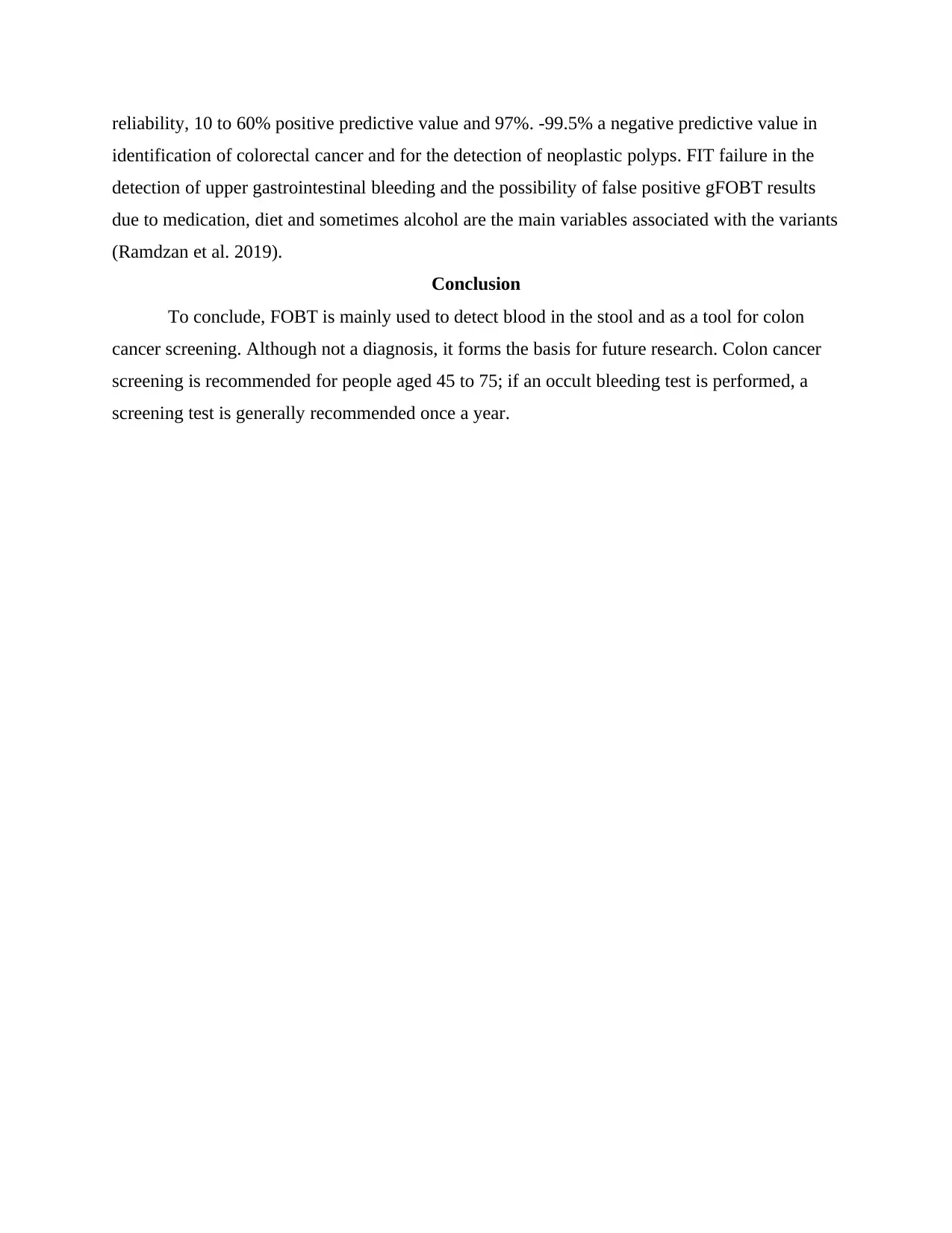
reliability, 10 to 60% positive predictive value and 97%. -99.5% a negative predictive value in
identification of colorectal cancer and for the detection of neoplastic polyps. FIT failure in the
detection of upper gastrointestinal bleeding and the possibility of false positive gFOBT results
due to medication, diet and sometimes alcohol are the main variables associated with the variants
(Ramdzan et al. 2019).
Conclusion
To conclude, FOBT is mainly used to detect blood in the stool and as a tool for colon
cancer screening. Although not a diagnosis, it forms the basis for future research. Colon cancer
screening is recommended for people aged 45 to 75; if an occult bleeding test is performed, a
screening test is generally recommended once a year.
identification of colorectal cancer and for the detection of neoplastic polyps. FIT failure in the
detection of upper gastrointestinal bleeding and the possibility of false positive gFOBT results
due to medication, diet and sometimes alcohol are the main variables associated with the variants
(Ramdzan et al. 2019).
Conclusion
To conclude, FOBT is mainly used to detect blood in the stool and as a tool for colon
cancer screening. Although not a diagnosis, it forms the basis for future research. Colon cancer
screening is recommended for people aged 45 to 75; if an occult bleeding test is performed, a
screening test is generally recommended once a year.
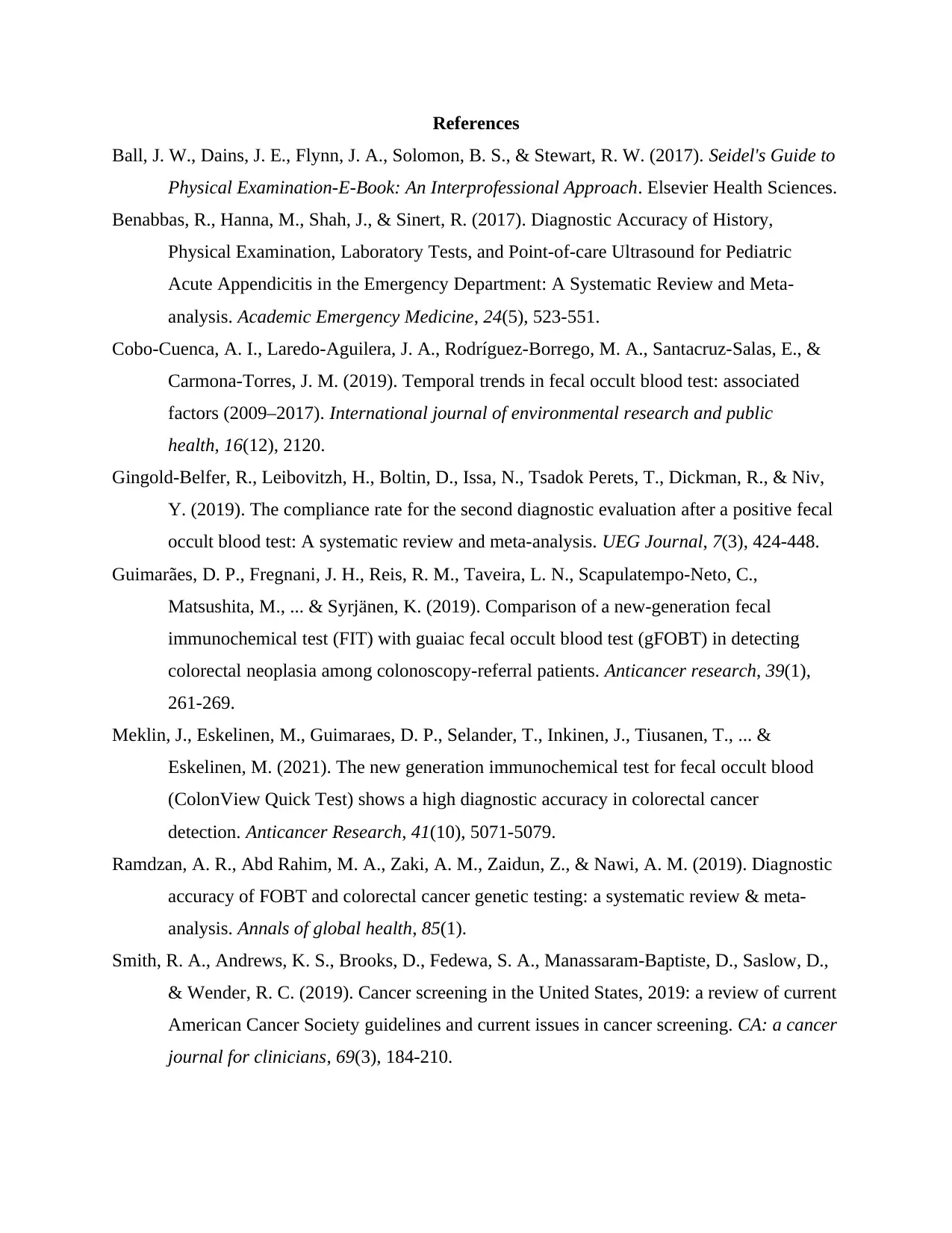
References
Ball, J. W., Dains, J. E., Flynn, J. A., Solomon, B. S., & Stewart, R. W. (2017). Seidel's Guide to
Physical Examination-E-Book: An Interprofessional Approach. Elsevier Health Sciences.
Benabbas, R., Hanna, M., Shah, J., & Sinert, R. (2017). Diagnostic Accuracy of History,
Physical Examination, Laboratory Tests, and Point‐of‐care Ultrasound for Pediatric
Acute Appendicitis in the Emergency Department: A Systematic Review and Meta‐
analysis. Academic Emergency Medicine, 24(5), 523-551.
Cobo-Cuenca, A. I., Laredo-Aguilera, J. A., Rodríguez-Borrego, M. A., Santacruz-Salas, E., &
Carmona-Torres, J. M. (2019). Temporal trends in fecal occult blood test: associated
factors (2009–2017). International journal of environmental research and public
health, 16(12), 2120.
Gingold-Belfer, R., Leibovitzh, H., Boltin, D., Issa, N., Tsadok Perets, T., Dickman, R., & Niv,
Y. (2019). The compliance rate for the second diagnostic evaluation after a positive fecal
occult blood test: A systematic review and meta‐analysis. UEG Journal, 7(3), 424-448.
Guimarães, D. P., Fregnani, J. H., Reis, R. M., Taveira, L. N., Scapulatempo-Neto, C.,
Matsushita, M., ... & Syrjänen, K. (2019). Comparison of a new-generation fecal
immunochemical test (FIT) with guaiac fecal occult blood test (gFOBT) in detecting
colorectal neoplasia among colonoscopy-referral patients. Anticancer research, 39(1),
261-269.
Meklin, J., Eskelinen, M., Guimaraes, D. P., Selander, T., Inkinen, J., Tiusanen, T., ... &
Eskelinen, M. (2021). The new generation immunochemical test for fecal occult blood
(ColonView Quick Test) shows a high diagnostic accuracy in colorectal cancer
detection. Anticancer Research, 41(10), 5071-5079.
Ramdzan, A. R., Abd Rahim, M. A., Zaki, A. M., Zaidun, Z., & Nawi, A. M. (2019). Diagnostic
accuracy of FOBT and colorectal cancer genetic testing: a systematic review & meta-
analysis. Annals of global health, 85(1).
Smith, R. A., Andrews, K. S., Brooks, D., Fedewa, S. A., Manassaram‐Baptiste, D., Saslow, D.,
& Wender, R. C. (2019). Cancer screening in the United States, 2019: a review of current
American Cancer Society guidelines and current issues in cancer screening. CA: a cancer
journal for clinicians, 69(3), 184-210.
Ball, J. W., Dains, J. E., Flynn, J. A., Solomon, B. S., & Stewart, R. W. (2017). Seidel's Guide to
Physical Examination-E-Book: An Interprofessional Approach. Elsevier Health Sciences.
Benabbas, R., Hanna, M., Shah, J., & Sinert, R. (2017). Diagnostic Accuracy of History,
Physical Examination, Laboratory Tests, and Point‐of‐care Ultrasound for Pediatric
Acute Appendicitis in the Emergency Department: A Systematic Review and Meta‐
analysis. Academic Emergency Medicine, 24(5), 523-551.
Cobo-Cuenca, A. I., Laredo-Aguilera, J. A., Rodríguez-Borrego, M. A., Santacruz-Salas, E., &
Carmona-Torres, J. M. (2019). Temporal trends in fecal occult blood test: associated
factors (2009–2017). International journal of environmental research and public
health, 16(12), 2120.
Gingold-Belfer, R., Leibovitzh, H., Boltin, D., Issa, N., Tsadok Perets, T., Dickman, R., & Niv,
Y. (2019). The compliance rate for the second diagnostic evaluation after a positive fecal
occult blood test: A systematic review and meta‐analysis. UEG Journal, 7(3), 424-448.
Guimarães, D. P., Fregnani, J. H., Reis, R. M., Taveira, L. N., Scapulatempo-Neto, C.,
Matsushita, M., ... & Syrjänen, K. (2019). Comparison of a new-generation fecal
immunochemical test (FIT) with guaiac fecal occult blood test (gFOBT) in detecting
colorectal neoplasia among colonoscopy-referral patients. Anticancer research, 39(1),
261-269.
Meklin, J., Eskelinen, M., Guimaraes, D. P., Selander, T., Inkinen, J., Tiusanen, T., ... &
Eskelinen, M. (2021). The new generation immunochemical test for fecal occult blood
(ColonView Quick Test) shows a high diagnostic accuracy in colorectal cancer
detection. Anticancer Research, 41(10), 5071-5079.
Ramdzan, A. R., Abd Rahim, M. A., Zaki, A. M., Zaidun, Z., & Nawi, A. M. (2019). Diagnostic
accuracy of FOBT and colorectal cancer genetic testing: a systematic review & meta-
analysis. Annals of global health, 85(1).
Smith, R. A., Andrews, K. S., Brooks, D., Fedewa, S. A., Manassaram‐Baptiste, D., Saslow, D.,
& Wender, R. C. (2019). Cancer screening in the United States, 2019: a review of current
American Cancer Society guidelines and current issues in cancer screening. CA: a cancer
journal for clinicians, 69(3), 184-210.
⊘ This is a preview!⊘
Do you want full access?
Subscribe today to unlock all pages.

Trusted by 1+ million students worldwide

Soin, S., Akanbi, O., Ahmed, A., Kim, Y., Pandit, S., Wroblewski, I., & Saleem, N. (2019). Use
and abuse of fecal occult blood tests: a community hospital experience. BMC
gastroenterology, 19(1), 1-7.
and abuse of fecal occult blood tests: a community hospital experience. BMC
gastroenterology, 19(1), 1-7.
1 out of 7
Related Documents
Your All-in-One AI-Powered Toolkit for Academic Success.
+13062052269
info@desklib.com
Available 24*7 on WhatsApp / Email
![[object Object]](/_next/static/media/star-bottom.7253800d.svg)
Unlock your academic potential
Copyright © 2020–2026 A2Z Services. All Rights Reserved. Developed and managed by ZUCOL.



